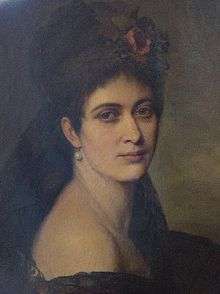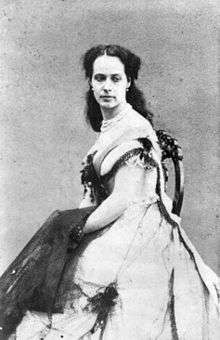Agnes Salm-Salm
| Agnes, Princess of Salm-Salm | |
|---|---|
 Agnes Elizabeth of Salm-Salm | |
| Birth name | Agnes Elisabeth Winona Leclerc Joy |
| Born |
25 December 1844 Franklin, Vermont |
| Died |
21 December 1912 (aged 67) Karlsruhe, Grand Duchy of Baden |
| Buried | Alter Friedhof, Bonn (50°44′09″N 7°05′25″E / 50.7358°N 7.0903°ECoordinates: 50°44′09″N 7°05′25″E / 50.7358°N 7.0903°E) |
| Allegiance |
|
| Rank | Captain (US) |
| Battles/wars |
American Civil War French intervention in Mexico Franco-Prussian War |
| Awards | Cross of Merit for Women and Girls (1872) |
| Other work | Red Cross |
Agnes Salm-Salm (December 25, 1844 – December 21, 1912) was the American wife of Prince Felix zu Salm-Salm, a Prussian mercenary beside whom she played a role in the American Civil War, the Mexican Civil War between President Benito Juárez and the Austrian archduke Maximilian I of Mexico, and the Franco-Prussian War.
Family and childchood
She was born Agnes Elisabeth Winona Leclerc Joy in Franklin, Vermont, the daughter of American general William Leclerc Joy (1793–c. 1886) and his second wife, Julia Willard (died 1882).[1] Her paternal grandfather was Mica (Micah) Joy (1753–1826) who married Mercy Terrill (1764–1843).[2] She was described as red-haired, strong willed, small, and dainty.[3]

Little is known of the early life of Agnes Salm-Salm. Many scholars believe that she worked in a circus, then as an actress in Cuba. In 1861 she returned to the United States but soon left her home in Vermont to visit her sister in Washington, D.C. who was getting married. Agnes stayed around Washington when she met Prince Felix Salm-Salm, a soldier of fortune, and a distant relation to the Emperor Franz Joseph of Austria-Hungary.[4] She had been riding her horse one morning through the city when Felix first saw her and he made sure she was invited to a party that he would be attending. Soon Felix proposed to her and they were married in August 30, 1862, despite opposition from her family (he was Catholic and she was Protestant).[3]
American Civil War
Prince Felix had a post as adjutant of Louis Blenker in the Army of the Potomac, and soon proceeded to the front. Agnes could not be apart from Felix for too long and eventually followed him to the battlefield. At his camp she would care for the sick and wounded soldiers although she had no previous knowledge of medicine.[3]
For four years she traveled with the troops through war-torn Virginia. As the wife of a colonel she had access to supply wagons and luggage meant for the officers and would often steal supplies in order to care for the soldiers. This sparked a controversy that President Abraham Lincoln eventually settled; the President also pinned a captain's star on her at the time. In January 1863 the troops were ordered to go to Aquia Creek, Virginia, and of course Agnes followed her husband. Here she made a bet that she would give President Lincoln three kisses within the next few days on his visit to the camp, and she succeeded in doing so.[Note 1]
Mexico
After the Civil War was over, Felix discovered an opportunity to join the army of Emperor Maximilian I of Mexico. When Agnes and Felix arrived in Mexico City, the French troops under François Achille Bazaine were leaving, as mounting diplomatic pressure from the United States persuaded Napoleon III to conclude his Mexican venture.[5]
When the Republicans surrounded Querétaro and Maximilian was forced to surrender despite the last minute efforts by Felix Salm-Salm and a company of Hussars to rescue him. Agnes made great efforts to spare the life of Maximilian and her husband, traveling several times from Querétaro to Mexico City and San Luis Potosí where she held interviews with President Benito Juárez, General Mariano Escobedo, General Porfirio Díaz and several other prominent officers of the Republican Army.[6]
Agnes knelt and, crying, begged President Juárez to forgive the Emperor. The President's answer has become famous in Mexican history textbooks: "It causes me great pain, Madame, to see you like that on your knees; but even if every king and queen were in your place, I couldn't spare his life. It isn't me who takes it from him, it is the people and the law who claim his life". Juárez had already received telegraphs from most of the heads of the European states asking him to spare Maximilan. Upon Juárez's denial the brave woman answered, "Oh, if blood must be spilled, then take my life, the life of a useless woman; and spare that of a man who can still do much good in other country." Juarez did offer to spare the life of her husband, however, Maximilan would undergo a courts martial.[7] The scene was painted by the Mexican painter Manuel Ocaranza.[8]
Subsequently, she planned an escape for the Emperor and her husband. The plan was to get Colonel Villanueva to escort the Emperor to Veracruz, but Villanueva would not go through with it without the cooperation of Colonel Palacios. A bribe was in order. Agnes had offered two promissory notes for 100,000 pesos to each of them which would be honored by Maximilian's brother, Franz Joseph. While they were in her parlor Agnes revealed the plan to Palacios, who had told her earlier that he sympathized with the Emperor. Palacios was skeptical and said he would give her his answer in the morning. Agnes agreed, believing he would go through with it.[6][9] Maximilian was executed 19 June 1867 in Santiago de Querétaro.[6]
Franco-Prussian War
When Felix went to Europe to fight again in the Prussian Army, Agnes soon joined him via New York. In 1868 they arrived in Berlin. Because of their attempts to free Maximilian, the prince was again accepted at court along with his wife. In Europe she was the star of all the social circles in the capital as well as in Karlsruhe where she lived. During the war she continued to travel along with her husband and served among the medical staff. She was awarded the Cross of Merit for Women and Girls for army relief work.
Later years
On August 18, 1870, Felix Salm-Salm was killed in combat at Saint-Privat-la-Montagne during the Battle of Gravelotte. Afterward, his widow remained an active seeker for justice in the world, collecting funds for military hospitals. She lived for several years in Switzerland and Italy, part of the time with friends the Baron and Baroness von Stein. In 1876 she remarried the British diplomat, Charles Heneage, but this marriage was dissolved. She returned briefly to the United States in 1899,[10] but later settled in southern Germany. She wrote a book of memories titled Ten Years of My Life (2 vols. London: Richard Bentley and Son, 1876). She died in her apartment in Karlsruhe, Germany, on December 21, 1912, and is buried in the Alter Friedhof, Bonn.[11]
Notes and Citations
Notes
- ↑ This apparently caused some marital discord between the Lincolns, however; Mary Todd Lincoln, a jealous woman, did not like the idea of her husband being kissed on both cheeks and the lips by a hoydenish girl. According to his aides, they were heard arguing about it later in the evening, although Mrs. Lincoln eventually forgave him. See A Kiss from a Princess Sources: Chancellorsville by John Bigelow, Jr.; The Lincolns by Daniel Mark Epstein; Ten Years of My Life by Agnes Elizabeth W. Salm-Salm; Soldier Princess: The Life & Legend of Agnes Salm-Salm in North America by David Coffey; A Biographical Memorial of General Daniel Butterfield edited by Mrs. Julia Lorrilard Safford Butterfield. Washington in Lincoln’s Time, by Noah Brooks. Chancellorsville by Stephen W. Sears.
Citations
- ↑ Ian Fettes, Joy Family Genealogy, Updated 2011. Accessed 14 October 2015.
- ↑ Dodd, Jordan, Liahona Research, comp. Massachusetts, Marriages, 1633–1850 [database on-line]. Provo, UT, USA: Ancestry.com Operations Inc, 2005. Accessed 14 October 2015. (subscription required)
- 1 2 3 A Victorian Lady's Trip to Europe Summer 1914: Rachel Brewer Halsey's diary. Accessed 14 October 2015.
- ↑ John J. Duffy, Samuel B. Hand, Ralph H. Orth,The Vermont Encyclopedia, UPNE, 2003, p. 185.
- ↑ encyclopedia Britannica, Mexico: French intervention
- 1 2 3 Henry Parkes, A History of Mexico. Boston: Houghton Mifflin, 1960, p. 273. ISBN 0-395-08410-5.
- ↑ Daniel Moreno. El sitio de Querétaro. Según protagonistas y testigos. (Editorial Porrúa, 3° Edición, México 1982)
- ↑ Esther Acevedo, Entre la ficción y la historia: La denegación del perdón a Maximiliano, An. Inst. Investig. Estét vol.23 no.78 México mar./may. 2001.
- ↑ Donald W. Miles, Cinco de Mayo: What is Everybody Celebrating? , pp 230–232.
- ↑ THE PRINCESS SALM-SALM HERE, New York Times,April 05, 1899.
- ↑ Agnes Elizabeth Salm-Salm, Ten Years of my Life Archived September 16, 2008, at the Wayback Machine., Richard Bentley and Son, 1876.
Further reading
- Coffey, David (2002). Soldier Princess: The Life and Legend of Agnes Salm-Salm in North America, 1861–1867. Texas A&M University Press. ISBN 978-1-58544-168-6.
- Salm-Salm, Agnes Elizabeth W. (1876). Ten Years of My Life, p. PR3, at Google Books. London: Richard Bentley & Sons.